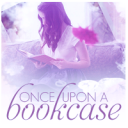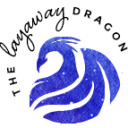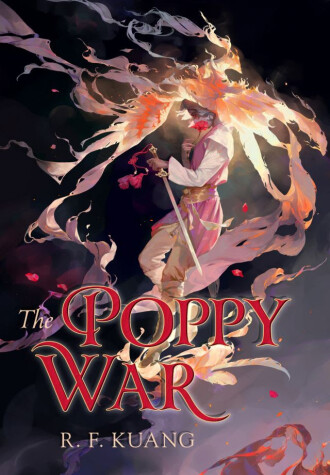
When Rin aced the Keju - the test to find the most talented students in the Empire - it was a shock to everyone: to the test officials, who couldn't believe a war orphan from Rooster Province could pass without cheating; to Rin's guardians, who had hoped to get rich by marrying her off; and to Rin herself, who realized she was finally free from a life of servitude. That she got into Sinegard - the most elite military school in Nikan - was even more surprising.
But surprises aren't always good.
Because being a dark-skinned peasant girl from the south is not an easy thing at Sinegard. Fighting the prejudice of rival classmates, Rin discovers that she possesses a lethal, unearthly power - an aptitude for the nearly-mythical art of shamanism. Exploring the depths of her gift with the help of psychoactive substances and a seemingly insane teacher, Rin learns that gods long thought dead are very much alive - and that mastering these powers could mean more than just surviving school.
For while the Nikara Empire is at peace, the Federation of Mugen still lurks across a narrow sea. The Federation occupied Nikan for decades after the First Poppy War, and only barely lost the continent in the Second. And while most people calmly go about their lives, a few are aware that a Third Poppy War is just a spark away...
Subterranean Press exclusive signed edition, featuring:
- Two color printing throughout on Finch, the paper used for higher end limited editions.
- A Full-color dust wraparound dust jacket.
- Full-color endsheets.
- Two full-color, full-page interior illustrations.
- A chapter head-illustration.
Limited to 500 signed numbered copies. ($185)
And 26 signed, lettered copies. Bradel bound and housed in a custom traycase. ($750)
- Publish Date July 2022 (first published 1 May 2018)
- Publish Status Forthcoming
- Imprint Subterranean Press
- Format Hardcover
- Language English
- Special Exclusive Design Numbered Signed
Reviews


Laurie

Renee
It was new for me to see so many timejumps in a book. Personally, I liked this aspect of the book, but it had the downside that we did not really see Rin evolve as a character. We always just had to accept who she was, because people change a lot during these years, 16 to... 19? 21? I'm not sure. I did not mind it for a second, and I actually enjoyed it. However, it also meant that it is very action packed and some events could have used some more buildup or more explanation. It seemed like the book jumped from one event to another, which is probably something that does not work for everyone.
The shamanism was confusing in the beginning. It took me a long while to figure out exactly how it worked. However, it was explained well and I liked how using magic either drove you insane or addicted to drugs.
A lot of people have a problem with the way Rin handled her period. Personally, I believe that it was very much a thing that her character would do without thinking too much about it. She had dedicated her whole life for being at that school, no way she would ever let anything stand in her way. Yes, it ruined the representation of periods of strong women, but we don't need a representation of everything in every single book. Also, Rin is a very flawed character, I don't think I ever agreed with her choices and I was constantly thinking that she should stop acting so stupid. It is understandable why she acts this way and it is very much in her personality to do these things, but they definitely don't make for a perfect person. However, I do not agree that removing her womb is a plot device such that she is the last Speerly. To be honest, does anyone really care?
In the end, I can only conclude that this was a very dark fantasy novel with gruesome depictions of the aftermath of war. It is definitely not for the faint-hearted. It made the book very realistic, but also awful when you realize that these things happened in real life as well. It is based on truths and the author did her research very well. I highly praise it, but this book is definitely not suited for everyone.

adamfortuna

wyvernfriend
The Dragon Emperor is dead, decades later, the Gatekeeper is missing and the Vipress sits on the throne and the Mugen Federation is still a threat.
In this world war orphan Fang Runin finds herself having to make a choice. She can marry or she can fight for her right to be in the Military Academy in Sinegard. There she finds a lot of obstacles and powers she didn't realise existed. Powers that are officially forbidden.
There's a lot in here and a lot of things that you can see will have implications later in the series. It led to another bad decision book club moment where I kept "just reading to the end of a chapter" until I finished the book. There were a few moments where the bad decisions felt more plot driven than character driven but I'm sure this will be worked out in later books. It's going to be an interesting ride. There were interesting philosophical moments where the author was looking at belief and how magic and belief could be linked and how it could have implications when you didn't believe.
I hope there's a more human side of the Mugen Federation in later books because so far they're very single-minded and not very nice.

liz089
This was such a good novel !
I don't even know where to begin ? So much happens and the MC is just...
Just read it.

luddite
The pacing is very good overall, but it flags at the 60% mark. I think that's a deliberate choice - Rin lacks agency in this stretch of the book, being more of an observer, and that's reflected in the writing. Altan's character and the portrayal of the gods serves as a good canvas to reflect on how we ascribe external justifications for our violence, and the enduring effects of this violence.
It gets brutal and violently graphic later in the book; I had to stop reading for a bit. But I guess that's the point when you're talking about the unforgivable horrors of war. This particular portrayal will stay with me.
Pick up this book if you're a history buff and love the competitive school fantasy trope. This series holds great promise.

Jo
The Poppy War by R. F. Kuang, a high fantasy inspired by Chinese history, was a book I was hugely looking forward to, but one I, sadly, didn't enjoy. My lack of enjoyment isn't down to the book being a bad book. It is undeniably incredible; well-researched, unflinching in it's honesty of the brutality of war, and it definitely punches you in the gut. It's more of a case of, it's not the book, it's me.
At first, the pacing felt a little odd to me; before you're even half way through the book, three years have gone by, with most of those years brushed over. We only get the highlights of Rin's training at Sinegard. Her relationships with her fellow students - all pretty bad as she's bullied by all except Kitay, but especially Nezha, because she is poor, from the south, is dark skinned, and not unskilled. We see how she is loathed by some some teachers and praised by others, how she is trained in shamanism by Master Jiang, my favourite character of them all, a little out there, quite eccentric, dismissed as useless by all other teachers, but overall, probably the most sane person in this whole book. It just felt really odd to me this YA-feel school training felt quite rushed through, but then it became clear why. This book is not about Rin's training. It is about, as the title suggests, war, and Rin's part in it.
While the first half of the book spans three years, the next half spans months. Months of war when the Federation of Mugen invades Nikara for the third Poppy War. And it is terrible. Because of her training in shamanism, and her connection to one of the gods, Rin is put into a very tiny division of fellow shamans; a rag-tag group of teenagers and young adults, all with various magical abilities, all who are viewed by all other divisions as dangerous and no help at all. Because being a shaman, having a connection with a god, means you will eventually become mentally ill. They're not trusted. But Rin is part of this division, and it's helping two other division try and hold Khurdalain, on the east side of Nikan, which the Federation are targeting. Months are spent in this important city that Nikan can't lose without losing the war. And the Federation are brutal and unrelenting.
And this is where I found myself not enjoying the book. Because there is absolutely no let up. It shows the everyday realities of war - with some shamanism thrown in - and it was goddamned bloody awful. In other high fantasies I've read that feature war, the main characters are normally royals or related to royals; they take part in the war, but they're also planning and strategising. We don't spend time with the ordinary people who are fighting the war, except for when the royals are fighting along with them. With The Poppy War, every character is a soldier - if varying rank, sure, but still the ones fighting every day. And when I say there was no let up, I mean there was no let up. Things go from bad to worse, and it continues down that path. The Federation absolutely devastate Khurdalain time and again. At first, I was shocked and disgusted, my jaw hanging open. But it kept getting worse and worse, that I almost became immune to it all. Not completely, I was still blown away by the extent of the Federation's brutality, but I was also getting pretty tired of it, and wanted something else to happen. It just goes on and on and on. Don't get me wrong, we need to see the atrocities of war, we need to see what humans are capable of, what they have done in the past, the war crimes that are committed. We need to see it, and we need to face it, and look it all in the eye. But this was for almost half a book, and I started to lose interest. I knew what was going to happen: the Federation would pull something else about the bag, do something horrific that would have massive consequences, and then they would up the ante again. And again. In the end I was reading just to get the book finished, because it was just too much for me. Not too much in that it went too far, but too much in that it was endless.
And when other things did happen, they happened so late on, and by then I was already past it. And the things that did happen were just terrible too - a different kind of awful, but just as bad. I liked most of the characters in this book, and I really liked Rin. But my god, does she make some really awful decisions. And I don't mean she makes them by mistake. She knows her choices, she knows what the possible consequences are, and she does them anyway. Despite all the warnings. Because she's greedy and wants power, because she wants to impress, because she is so affected by what she's seen that she can't even fathom doing anything else. The story would absolutely not be the same story if Rin didn't make those decisions - there would be no story if she didn't make those decisions. But still, as much as I liked her, I thought she was a fool. Such a bloody idiot. And also, such a hypocrite. And that's really putting it lightly. But I do think that's part of why I liked her, because she's so human, and she's flawed, and her emotions do play a part in her decisions, and in that sense it's realistic. But my god, the consequences!
As I've said, there's no denying that this book is incredible, but I really didn't enjoy the experience of reading it. It was a hard slog to get through, because I wasn't enjoying it. But it really is down to the fact that I am the wrong reader for this book. So many people have loved The Poppy War, so do read other reviews before deciding whether or not you'll read it.
Thank you to HarperVoyager via NetGalley for the eProof.

Amber (The Literary Phoenix)
This book absolutely gutted me.
There are loads of really great elements about it - who doesn't love a good boarding school story? - but I can't get past the aspect of war. R. F. Kuang writes it saw raw and real and I am disgusted but I am supposed to be. This book sort of makes me want to claw out my eyes, for the grotesque horrors I have imagined, thanks to the precision of her writing. When I think about Kitay's story, or Venka's, it makes me sick. I'm just going to throw the trigger warnings out front, and this is just off the top of my head - self-harm, drug use, genocide, rape, war, everything?
Just. Wow.
Do note as I'm saying all this, I gave the book five stars. I would have given it ten stars. The violence and unspeakable acts build a world in the midst of war, and it's perfectly accurate for that situation. We don't want it to be accurate. We want it to be ... tidier. But war makes monsters of men (and women).
This story is incredibly powerful. I loved that good and evil were not black and white. I loved that the characters kept making terrible, irrational decisions. I loved the magic and the consequences of it. The setting, the writing... honestly, I couldn't put this one down. I devoured it in every spare moments, up until I needed to break away because I felt like I couldn't breathe. Then I would pick it back up again. It's an incredible book, but it's not for the faint of heart, so please don't go into this one expecting a cheery fantasy adventure with an Asian protagonist. It's so much more than that.

layawaydragon
Yes, it is very dark. There's SO MANY content warnings. Some descriptions and atrocities are going to stuck in my head for awhile.
I listened to the audiobook. Since a policy change at work, I had to listen on my offtime which took longer and put a damper on my mood. The audiobook is good for knowing how to pronounce everything (unsurprisingly, I found out several things I'd been saying wrong my whole life) and getting more in tuned with Rin. SO much emotion comes through. I think the narrator did a fantastic job.
It is VERY long audiobook at 18+ hours. It's one of the longest I've listened to and sometimes the rhythm didn't jibe with me. I had to take breaks from it as it was so dark and so dense. But I've only been using audiobooks for 6 months so YMMV.
While I wasn't a fan of the painstaking learning in the first half, it did help make me understand and believe in the shaman aspect. I'm like Kitasu(sp? damn audibook!) in that regard.
I will admit, before earreading The Poppy War I had forgotten all about shamans. Like forgot they were a thing completely.
I also thought this was a standalone, so I was perplexed at how long some aspects were and how it was going to wrap up. Of course, then I got to the end and realized, def NOT the last book. I will admit part of me wished it was one and done, but now that I've had time and space from finishing, it has to be continued on. It's the first in a trilogy.
Years and years ago, I've read and loved books like Game of Thrones and Joe Abercrombie's work. Then I learned and grew, became a better person and that kind of shit got real tiring and didn't hold up under a more critical mind. I really should go back and delete my reviews and ratings for those damn things. Anyways, The Poppy War is for fans of those kind of series without the white male massively problematic shit.
Next time, I don't know if I'll do the audio or ebook or paper version. But I will be looking out for the next one for sure!
Kuang did publish an online map for those of us that use audiobooks, which DOESN'T come with a map. Link: https://rfkuang.files.wordpress.com/2018/05/screen-shot-2018-05-07-at-12-49-07-am.png?w=1086
